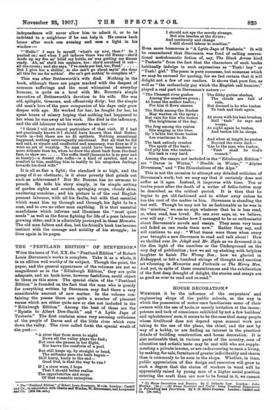THE " PENTLAND EDITION " OF STEVENSON.* WITH the issue
of Vol. XX. the " Pentland Edition " of Robert Louis Stevenson's works is complete. Take it as a whole, it is an edition well worthy of its subject. Though the print, the paper, and the general appearance of the volumes are not so magnificent as in the " Edinburgh Edition," they are quite adequate, and no book-lover, however fastidious, could object to them on this score. The special claim of the " Pentland Edition" is founded on the fact that the man who is greedy for everything written by Stevenson may find there a very considerable amount of new matter. In the volume con- taining the poems there are quite a number of pleasant verses which are either quite new or else not included in the " Edinburgh Edition." Among the best of these are the " Epistle to Albert Dew-Smith" and " A Lytle Jape of Tusherie." The first contains some very amusing criticisms of the people of Davos and of the little river which runs down the valley. The river called forth the special wrath of the poet:— " A river that from morn to night
Down all the valley plays the fool; Not once she pauses in her flight,
Nor knows the comforts of a pool.
But still keeps up, by straight or bend, The selfsame pace she hath begun— Still hurry, hurry to the end— Good God, is that the way to run ?
If I a river were, I hope
That I should better realise The opportunities and scope Of that romantic enterprise.
• The " Pentland Edition" of Robert Louis Stevenson. 20 yob, London : Cassell and Co,, in association with Chatto and Windue. W. Heinemann, and L014"4118 Mid CO, [810 108. now
I should not ape the merely strange, But aim besides at the divine ; And continuity and change
I still should labour to combine."
Even more humorous is "A Lytle Jape of Tusherie." It will be remembered that Stevenson was fond of calling conven-
tional melodramatic fiction of, say, The Black Arrow kind
"Tusherie" from the fact that the characters of such books habitually indulge in such expressions as " Tash! boy " or "Tush! girL" The poem is pure nonsense, but nonsense which we may be excused for quoting, for we feel certain that it will delight not a few of our readers. It shows that pure fun, as well as "the melancholy gay which the English call humour," played a real part in Stevenson's nature :—
"The Pleasant river gushes The filthy gutter slashes,
Among the meadows green; The clouds are full of At home the author tushes; rain, For him it flows unseen. But doomed is ho who tushes The Birds among the Bushes To tush and tush again.
May wanton on the spray ; But vain for him who tushos The brightness of the day.
The frog among the rushes Sits singing in the blue.
By 'r but these tushes Are wearisome to do.
The task entirely crushes The spirit of the bard: God pity him who tushes- His task is very hard.
Among the essays not included in the "Edinburgh Edition" are "Davos in Winter," "Health in Winter," "Alpine Diversions," and " The Stimulations of the Alps."
This is not the occasion to attempt any detailed criticism of
Stevenson's work, but we may say that it certainly does not suffer as it ages. Instead, it improves with time. Ten or twelve years after the death of a writer of belles-lettres may
be described as the critical period. It is then that he begins to get old-fashioned and to wither away unless he has the root of the matter in him. Stevenson is standing the
test well. Though he may not be as fashionable as he was in the " nineties," we see no sign whatever that he is less read, or, when read, less loved. No one ever says, or, we believe, ever will say : "I wonder how I managed to be so enthusiastic about Stevenson's novels and essays. They seem very tame and faded as one reads them now." Rather they say, and will continue to say : " What times were those when every year brought a new Stevenson to read and talk about ! How we thrilled over Dr. Jekyll and Mr. Hyde as we devoured it in
the dim light of the omnibus or the Underground on the
very day of publication ; how we sat up shaking with helpless laughter to finish The Wrong Box ; how we gloried in Kidnapped, or felt a hundred strings of thought and emotion set vibrating in Memories and Portraits or The Merry Men. And yet, in spite of these remembrances and the exhilaration
of the first deep draught of delight, the stories and essays are as good as ever to read and re-read." At morn with his hair brushes, Still tusk he says and weeps; At night again he tushes, And tushos till he sleeps.
And when at length he pushes Beyond the river dark— 'Las to the man who tushes,
'Tush' shall be God's
remark."


















































 Previous page
Previous page